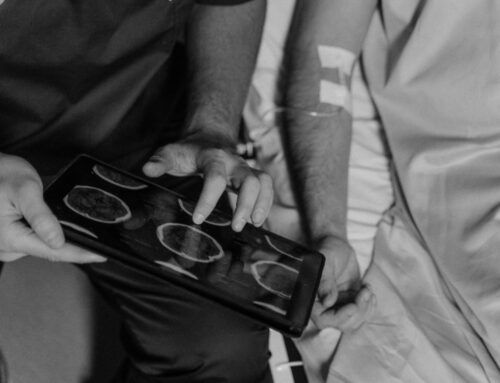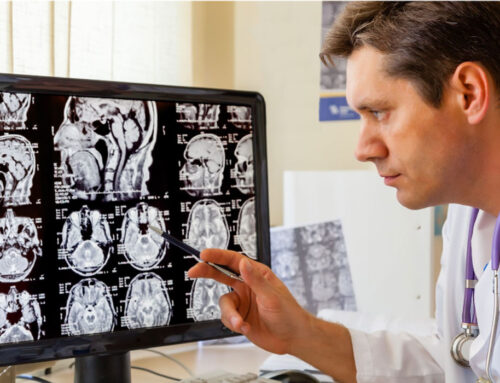A painful headache can be worrisome. When experiencing such headaches, you may wonder if the headache is a sign of a more serious issue like a brain tumor. But remember that brain tumors are not the usual cause of headaches. Less than 90,000 people in the US receive a brain tumor diagnosis yearly.
Most brain cancers begin elsewhere in the body before spreading to the brain. These tumors are referred to as metastatic brain tumors. The term “primary brain tumor” refers to tumors that develop in the brain. Therefore, the majority of headaches aren’t a problem. However, a headache is the most typical sign of a brain tumor.
It can be a little more reassuring to know how to differentiate a typical headache from one that a brain tumor may cause. However, the best way to spot a tumor is through your healthcare provider. You should always consult your doctor whenever you have any worrying symptoms, such as headaches and other related symptoms. Many times, the presence of additional symptoms can assist your doctor in determining how serious your condition is and how to proceed.
Brain Tumor Headache Symptoms
There are usually no noticeable symptoms in the early stages of a brain tumor. Headaches from a brain tumor only start when it grows big enough to press against the brain or nerves. Certain brain tumor headache patterns clarify how the nature of a headache caused by a brain tumor differs from a migraine or tension headache.
It is important to remember that other conditions like a hangover or obstructive sleep apnea as well as a variety of other causes can also cause headaches to occur when waking up. Morning headaches, for instance, can be a sign of a brain tumor. However, pay attention if your headaches become more severe, change in type, or become more regular, as these may be signs of a brain tumor.
Similarly, you should visit your doctor as soon as possible if you don’t experience headaches often but start to get regular, excruciating headaches.
Listed below are some headache symptoms that should be raised to your healthcare provider.
- Headache discomfort that is unresponsive to common analgesics like acetaminophen, aspirin, or ibuprofen.
- Persistent headaches lasting for days to weeks
- Headache pain that worsens when lying flat..
Headaches due to a brain tumor are occasionally mistaken for migraines due to the intensity of the pain. Migraine headaches, however, can trigger nausea and a heightened sensitivity to light. Most often, additional symptoms accompany headaches from a brain tumor.
Accompanying Symptoms of a Brain Tumor-Related Headache
The following are some of the most typical additional symptoms of a brain tumor:
- Diplopia (double vision), blurry vision, or visual loss
- Seizures
- Unexplained weight loss
- Hearing loss
- Sudden inability to speak
Consult A Neurosurgeon
Inform your doctor if you develop severe headaches after receiving a cancer diagnosis for another part of your body, as your brain could have been affected by the malignancy. Prepare to explain each symptom you experience, as it may help your doctor develop a more effective treatment strategy. You should also consult your neurologist in Newport Beach if a headache persists for days or weeks with little relief and you have no history of malignancy.
A headache that worsens despite taking typical pain relief should also be assessed. Other symptoms like weight loss, sensory alterations (such as hearing loss or visual impairments), and muscle numbness should be swiftly examined along with a headache.
Brain Tumor Treatment
There are various types of brain tumors, and each differs based on the cells’ origin, the tumor cells’ aggressiveness, whether the cells are malignant or benign (non-cancerous), and many other factors. When deciding the best treatment for brain tumors, factors such as the tumor’s size, nature, and location are considered. If you are diagnosed with a brain tumor, treatment will also depend on your age and general condition.
Brain tumor treatment options to discuss with your doctor include:
- Surgery: Brain tumor surgery in Orange County is performed by a neurosurgeon to remove brain tumors. With the help of sophisticated devices and new surgical procedures, a neurosurgeon in Newport Beach may now perform brain tumor surgery and access the brain without making a large incision that may require a longer healing period.
- Radiation therapy utilizes external x-ray beams or other types of radiation to destroy cancer cells and reduce the tumor size. This treatment can also be performed by temporarily implanting radioactive material into the brain.
- Chemotherapy: This treatment method is quite difficult for brain tumors. This is due to the blood-brain barrier, which shields the brain from certain substances in the blood. Research is ongoing to develop chemotherapy drugs that can safely and successfully penetrate the blood-brain barrier to eliminate tumors.
Your doctor may also try to manage the symptoms of your brain tumor headache by using steroids to lessen swelling and inflammation and relieve pressure on the nerves without aggressive cancer treatment. Your doctor may prescribe anti-seizure or anti-epileptic medications if seizures are a concern.
What’s the Outlook?
Can brain tumors cause headaches? What do brain tumor headaches feel like? What does a brain tumor feel like? These questions are discussed above to increase your understanding of brain tumors and brain tumor headache patterns. The most important thing to remember is to pay attention to your symptoms and when they start to expand beyond the usual tension headache discomfort. Get in touch with Brain Spine MD or call (949) 383-4185 today to learn more about brain tumor headaches.



















